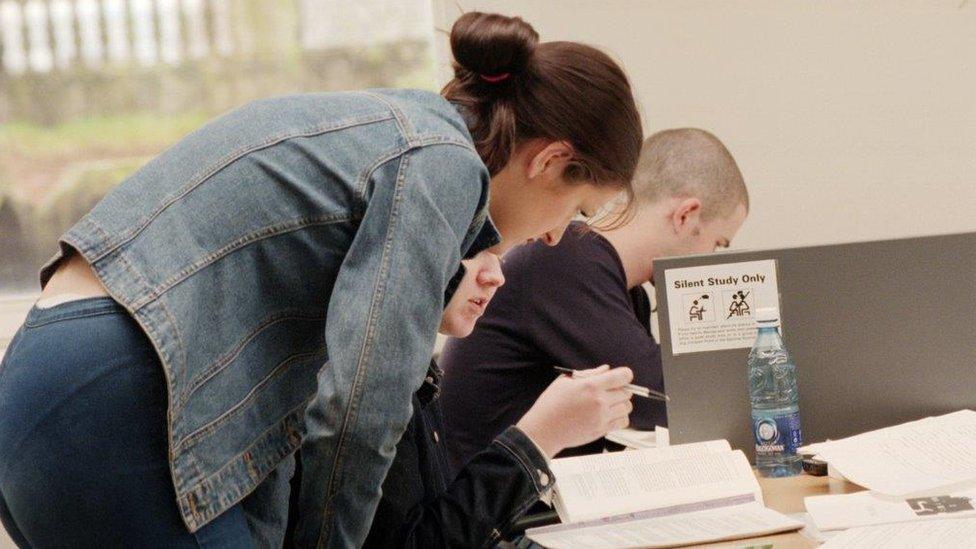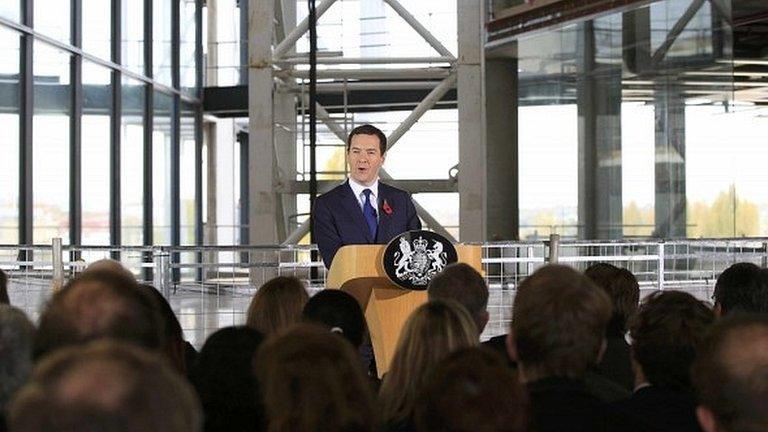Cuts could close four in 10 colleges, says Labour
- Published

The post-16 education budget is not protected from cuts
Up to four in 10 further education and sixth-form colleges in England could close if the government presses ahead with savings, says Labour.
College budgets are not protected and might be vulnerable to cuts in the 2015 Spending Review, says the party.
The analysis comes as further education members of the University and College Union strike over pay.
The government says it is determined young people should have funding to "enjoy high-quality courses".
Chancellor George Osborne has asked government departments to come up with savings plans for 25% and 40% of their budget ahead of the Spending Review on 25 November.
'Cliff edge'
Labour commissioned researchers at the House of Commons library to model the effect of a 25% cut on college budgets.
The researchers used last year's budgets, updated to this year's prices, to calculate that savings of 25% would amount to £1.625bn from a total budget of £6.5bn.
Almost three-quarters of the money goes to further education colleges, so if the cut fell proportionally FE colleges would lose £1.173bn and sixth-form colleges £451m overall, say the researchers.
According to the calculations this could mean the closure of 80 FE colleges and 56 sixth-form colleges - a total of 136 or 40% of the 335 colleges, says Labour.
Shadow education secretary Lucy Powell said the government was "putting post-16 education on a cliff edge, harming opportunities for the next generation and holding our young people and our country back".
"It is simply not possible to build a 21st-Century economy on falling investment in education," Ms Powell argued, saying Labour would have protected the whole education budget from cuts.

James Kewin, deputy chief executive of the Sixth Form Colleges Association, called the analysis "deeply worrying".
It "confirms our fears that some sixth-form colleges could be wiped from the educational map after the Spending Review.
Pay freeze
"Funding for 16- to 19-year-olds, already significantly lower than for younger students, has been cut three times since 2011 and it seems certain that further reductions will be made next year."
FE college staff, striking over a pay freeze, say they have suffered a real-terms cut of more than 17% over five years.
University and College Union general secretary Sally Hunt said she feared for the future of the sector.
"Colleges need stable investment to continue to help people of all backgrounds fulfil their potential," she said.
The Association of Colleges said the pay freeze reflected "stringent financial circumstances in the sector".
Colleges "simply cannot take more cuts", said chief executive Martin Doel.
Mr Doel urged the government to fund post-16 education at the same level as education for younger students, "to ensure adult skills training does not become a thing of the past".

Cuts risk narrowing the post-16 curriculum, says the University and College Union
The government announced area-based reviews, external of post-16 education and training in the summer, aiming to streamline spending.
"We need to move towards fewer, larger, more resilient and efficient colleges," wrote Skills Minister Nick Boles in guidance, external.
A Department for Education spokesman did not directly address Labour's figures but reiterated that the government was "reforming further education to give employers and local authorities a greater say over how and what young people are taught so that training meets local labour market needs, while ensuring the best return on investment for public funding".
"We are determined that post-16 providers have the resources they need to ensure young people in further education can enjoy high quality courses."
- Published9 November 2015

- Published11 August 2015

- Published20 July 2015
